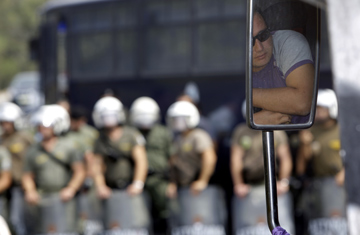
A driver is seen from the mirror of his truck as riot policemen block a highway west of Athens during a truck drivers' protest on Wednesday, Sept. 22, 2010
A week ago, Giorgos Triandafyllopoulos drove from his home in Lamia, in central Greece, to Athens to save the value of his trucking license — and, he hoped, his livelihood. The 48-year-old trucker joined hundreds of others as they blocked highways around Athens and picketed outside Parliament, chanting, "Eleftheria i thanatos!" ("Freedom or death!") — the war cry of Greek fighters who rebelled against Ottoman rule in the 1820s.
The protest was a last-ditch effort to stop the inevitable: Parliament's passing of a law on Wednesday, Sept. 22, to liberalize the domestic freight-transport industry. No new trucking licenses have been issued since 1970. Since then, the existing 33,000 licenses have been sold among truckers, sometimes on the black market, for up to 300,000 euros ($400,000), or passed on within families. The exorbitant prices truckers could demand for their licenses were bad enough. But it was the absence of real competition, which in turn drove transport costs up to become among the highest in Europe, that pushed the government to finally open up the industry.
"Can you believe it costs me less to rent tables and chairs from Brindisi, Italy, and bring them to Corfu for an event instead of transporting them from Athens?" says ship owner Nicos Vernicos, who is the president of the Greek International Chamber of Commerce. "That's what happens when a profession is closed."
But for Greece's truckers, the monopoly meant their licenses were valuable, guaranteeing them financial and job security. "Now the big cartels are going to come in, and we won't be able to sell either our trucks or our licenses for a decent amount of money," says Triandafyllopoulos, who bought his license last year for 66,000 euros ($85,000). "I followed the rules and paid for the license, but now the government is literally taking the money out of my pocket."
Transport Minister Dimitris Reppas has told Greek media that he hopes the new law, to be phased in over the next three years, will trigger competition, bring down freight costs and encourage the formation of haulage companies. The law also lifts the 40-year-old cap on new licenses, which will cost 1,500 euros ($2,000) — a drastic drop from today's prices. In the next few months, Parliament is expected to draft a broad bill to liberalize some 70 other closed-shop professions, including those of pharmacists, notaries and lawyers.
The changes come at the behest of the European Union and the International Monetary Fund, which lent Greece 110 billion euros ($145 billion) in May to save the country from defaulting on its 300 billion–euro ($400 billion) debt. In exchange for the money, Greece is supposed to drastically cut its deficit, crack down on pervasive tax evasion and liberalize closed-shop professions. This summer, the European Commission threatened to sue Greece unless it made moves to open up the closed professions quickly and abide by E.U. regulations.
Just by liberalizing its closed professions, Greece would boost its GDP 10% over the next five years and an additional 16% in the long run, says Yiannis Stournaras, general director of the Foundation for Economic and Industrial Research (IOBE), a respected think tank based in Athens. According to Stournaras, a 2006 IOBE study concluded that opening up the trucking sector alone would produce a 1% gain in GDP every year.
Stournaras and other economists have long advocated opening closed-shop jobs, but successive Greek governments have feared the potential short-term political costs of fighting with labor unions. Politicians have also worried that any economic benefits could take a long time to manifest themselves — at least, too long to help them win their next election. Stournaras says, however, that benefits would be seen within the first couple of years.
That's something that could benefit Prime Minister George Papandreou. The American-born Prime Minister's support has eroded since he was elected last fall, but he remains more popular than his opponents. Stournaras notes that most Greeks are against closed professions, which should help the government pass the broader liberalization law.
The truckers say they will press on with their fight against the new law while also demanding better pensions and improved tax treatment. "We are going to become poor because of [the law]," says Dimitrios Yakis, a 49-year-old trucker from Lamia who protested in front of Parliament on Wednesday. "There are no jobs in this country, and now I worry I won't be able to make a living anymore, with the new competition."
But Stournaras, who often calls Greece's "the last Soviet-style economy in Europe," says opening up the domestic trucking sector is "the mother of all liberalizations." Aside from the growth it will promote, he says, the new law will help the government recoup tax revenue that was lost when some trucking licenses were sold on the black market.
"And there will be lower prices, which will bring higher competitiveness and higher exports and even more jobs," says Stournaras. "There are so many synergies that come with opening up just this profession."
